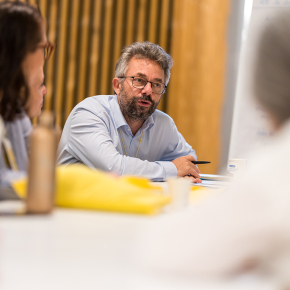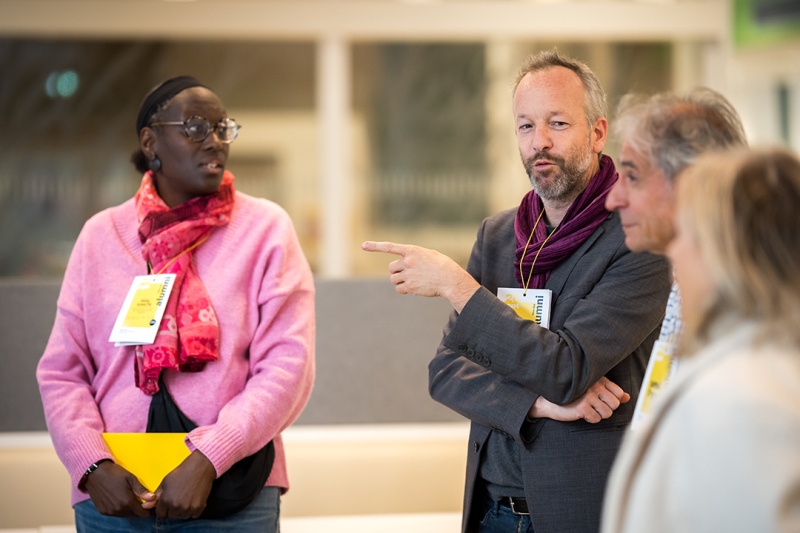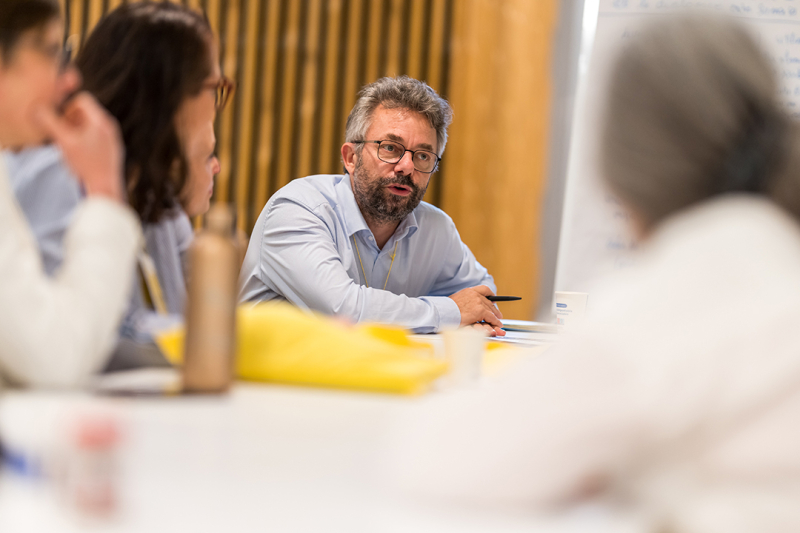'CNRS alumni' – "a tool for preserving memory and a lever for the future of the CNRS"
Since January 2025, the 'CNRS alumni' network has been bringing together all the people who have contributed to the CNRS's rich history. The initiative already boasts several hundred members and aims to act as a lever for connection, influence and lasting involvement. Interview with Guillaume Stahl, the network's general delegate, following on from the first 'Fête des Alumni' event.
What is your assessment of 'CNRS alumni' after its first months of existence?
Guillaume Stahl: The 'CNRS alumni' network was launched in early 2025 on the initiative of Antoine Petit, the CNRS Chairman and CEO. Its clearly-stated ambition is to bring together everyone who has ever worked at the CNRS – whether administrative, scientific or technical staff or people in charge of missions of interest – to help maintain lasting links with the organisation. Our starting point was this criterion of professional affiliation, with the idea of constructing a community that's open, interdisciplinary, international and also actually useful.
Currently we've got nearly 800 members who mainly currently work in the public and private sectors, but also local and national elected officials or staff members on external mobility schemes, as well as current CNRS staff members who wish to exchange ideas and collaborate with alumni. Our first observation is that the interest is definitely there. We observed a significant number of registrations right from the launch which confirmed what we saw as the initial need to be fulfilled - to reconnect our alumni, share experiences and promote their highly diverse careers. But another challenge very quickly emerged, namely how to build on this initial wave of commitment?
Today, the network's members consult content but often remain passive observers. Interactions on the platform remain limited, as do the number of events that our alumni spontaneously put forward. So, for us, this means there's a clear challenge – to stimulate engagement and create the right spaces so everyone can contribute, initiate ideas and interact. We've already started offering more interactive formats like alumni cafés, themed webinars or face-to-face meetings and we'll continue to build on this momentum. We want the platform to become a lively, useful and friendly place where people enjoy coming back, exchanging ideas and finding inspiration.
What are the network's objectives and prospects? How do you intend to reinforce its activities, particularly internationally and locally?
G. S.: We have multiple strategic ambitions – to maintain lasting ties with people who've worked at the CNRS, build up a pool of skills that can then be mobilised, and assert our scientific, societal and international influence. To achieve this, a strategic committee has been set up that's made up of the network members and representatives of various CNRS bodies. This committee has a key role to play in advising on major policy directions, ensuring strategy is aligned with the needs of our alumni and the priorities of the organisation, and promoting shared governance.
The international dimension is a core factor for the project. The CNRS has a global presence through our eleven offices outside France which serve as natural hubs for identifying alumni communities. We're working to bolster our connections with diplomatic networks, 'France Alumni', postdoctoral researcher associations, and on setting up meetings in different countries. By the end of this year, the platform will be fully available in English, and we'll be offering specific formats like profiles of alumni abroad, video interviews or international webinars. Also, at the local level, territorial anchoring is just as strategically important. We've identified several dynamic areas outside the Île-de-France region (Lyon, Grenoble, Toulouse, etc.) which have a high concentration of alumni so we can roll out pilot initiatives there - face-to-face meetings, after-work events, workshops, and so on.
The Alumni Day, held on September 26th of this year at CNRS headquarters, marked a real turning point in the momentum of the network. Almost 60 people took part, bringing together people from different generations and backgrounds. The afternoon was punctuated by alumni testimonials, participatory workshops for collective thought about the network's future and moments of conviviality, particularly the closing cocktail reception. There was a very warm atmosphere but the day also provided an opportunity to develop very tangible ideas for strengthening the activities of the network, structuring regional and international initiatives, and fostering mentoring. The workshop reports were shared in a plenary session with Antoine Petit present and confirmed people's genuine desire for involvement despite having often busy schedules. This event has laid the foundations for new initiatives, which we'll begin implementing in the months to come.
What is your personal view of the network, as an alumnus yourself?
G. S.: I myself spent my early years as a researcher before moving on elsewhere, including abroad. Returning today to steer this network is both an honour and a responsibility. I realise how much working at the CNRS shapes a professional career, whether for a thesis, a temporary position or an entire career.
Many people see the CNRS is a seminal institution but when you leave the links weaken. This is exactly what 'CNRS alumni' wants to avoid. The idea is all about keeping that sense of belonging alive in a different way over the long term, and providing a space in which this diversity of backgrounds is recognised, valued and involved.
My vision is clear – the network has to remain flexible, responsive, but also useful. The idea is not to multiply tools or messages but to provide real and tangible services, opportunities to meet, make yourself known and contribute. We have to remain close to people's needs – supporting young scientists, setting up mentoring schemes, organising round tables and strengthening the sense of belonging to a scientific community, even outside the CNRS.
I also believe in the power of storytelling through alumni profiles, stories of atypical career paths or working outside the academic field. This is all part of the network's DNA. Our task is to showcase these career paths, build bridges, and make CNRS alumni a real lever for the future of the CNRS as well as a tool for remembering the past.


